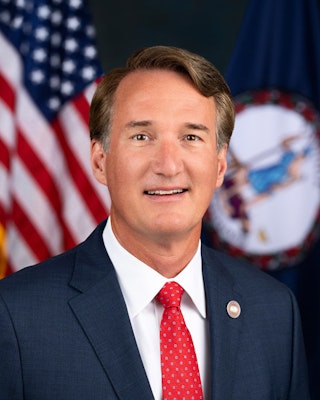Commonsense solutions
The Republican governor of Virginia on the path to progress in a politically divided state.
 Glenn Youngkin, Scottsdale, Arizona, on October 19, 2022. (Photo courtesy of Wikicommons)
Glenn Youngkin, Scottsdale, Arizona, on October 19, 2022. (Photo courtesy of Wikicommons)
Two years ago, Virginia embarked on a journey to fundamentally change the direction of a state that was languishing, and to instead embrace a path forward that meant accelerating growth and hope.
At the time, Virginia was ranked in the bottom third in the nation for job growth and 44th in reopening our schools coming out of the pandemic. Homicide rates were at a 20-year high, educational standards had been systematically lowered, and for nine straight years, more people had moved out of the state than in.
Today, as the governor of a purple state with a divided government, I’m often asked, “How do you get things done?”
The answer is that while politics are not easy – and yes, democracy requires real work – more often than not, when we embrace fact-based, commonsense solutions, we can find common ground and deliver real results. This is the foundation of building a better future.
When they elected me, Virginians voted for a government that serves as a catalyst, not an obstacle, for opportunity. And since Day 1, I have worked to keep that promise, whether that means spurring growth in our economy, raising standards in our education, building the best workforce, or transforming our behavioral health system – each a complex problem set.
Teaming up with the divided legislature, we went to work on a bipartisan basis to lower costs and ignite an economic recovery, delivering a historic $4 billion in tax relief – and then another $1 billion the next year, for a total of $5 billion in our first two legislative sessions. We launched lab schools to inject choice and innovation into our public education system, provided funding for infrastructure and equipment, and raised teachers’ salaries 12%. We passed the Virginia Literacy Act to begin raising educational standards. And more recently, we came together around the ALL In Virginia plan, injecting hundreds of millions of dollars in funding for targeted intensive tutoring help in math and reading to tackle persistent learning loss stemming from unnecessary forced school closures during the pandemic.
Worried about increased rates of depression, anxiety, and violence in the workplace, we also went to work to address a mounting behavioral health crisis. Our system simply wasn’t built to address the growing need for care. So we began to build capacity, unveiling in December 2022 our Right Help, Right Now plan, which provides pre-crisis, in-crisis, and post-crisis help. I was proud to sign 24 bipartisan bills to further this effort and to foster collaboration among various stakeholders, including nurses, patients, law enforcement, and community and faith leaders.
Already, the results of all this work are pouring in. Virginia has gone from the bottom third in the nation in job growth to the top three, with 230,000 more Virginians working today than when we started in January 2022. Indeed, we recently hit a 12-year high in labor participation, and the total number of Virginians working is higher than ever before.
When working to address complex issues, we’ve applied commonsense solutions grounded in facts and data and coupled with measurable outcomes.
We are also laying the foundation for future growth. Since the start of my administration, we’ve welcomed nearly $71 billion in capital investment, which is more than 2.5 times greater than during any other two-year period in the past 25 years, according to the Virginia Economic Development Partnership.
Despite having a divided government, Virginia has implemented comprehensive, commonsense solutions to our most pressing problems. When working to address complex issues, we’ve applied commonsense solutions grounded in facts and data and coupled with measurable outcomes. And this approach is working.
Virginia is a microcosm of America. It was here that the foundation of our nation was laid, where Patrick Henry, who would become Virginia’s first governor, uttered the immortal words, “Give me liberty or give me death,” which have served as a guidepost for generations as we strive to unleash opportunity.
Our country is more divided than ever and faces looming crises – including a $33 trillion debt, a porous border, a major decline in student performance, a massive fentanyl problem, and conflict around the globe; 75% of Americans say our nation is on the wrong track. The United States needs a new approach, and politicians in Washington, D.C., should look to Virginia for a blueprint.
States run by Republican governors outperform their Democratic neighbors at an extraordinary rate. The latest state jobs report, for example, shows that coming out of the pandemic, eight of the top 10 states that have recovered the most jobs since the pandemic have a Republican governor. That and other accomplishments are the result of conservative principles. These include free enterprise, peace through strength, respect for our laws and law enforcement, and, critically, empowering our next generation of students to climb the ladder of opportunity by raising the expectation ceiling and the floor.
In his final public address in March of 1799, Henry made a less familiar but more pragmatic call: “Let us not split into factions which must destroy that union upon which our existence hangs.” As we strive to build that more perfect union and arrive at our ultimate destination – the shining city on the hill – we must do it together, with common sense.
The Catalyst believes that ideas matter. We aim to stimulate debate on the most important issues of the day, featuring a range of arguments that are constructive, high-minded, and share our core values of freedom, opportunity, accountability, and compassion. To that end, we seek out ideas that may challenge us, and the authors’ views presented here are their own; The Catalyst does not endorse any particular policy, politician, or party.

